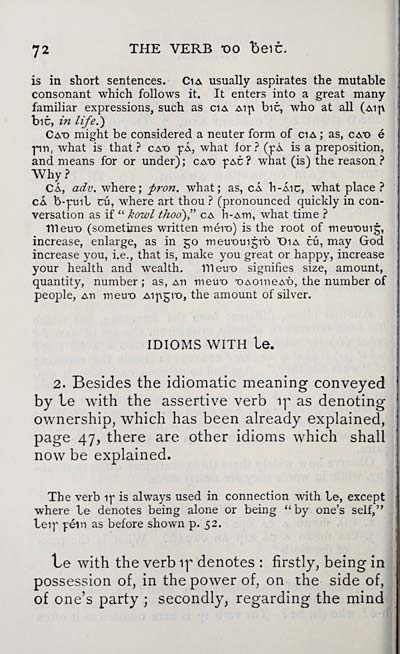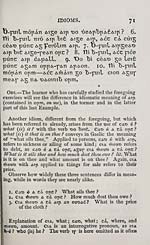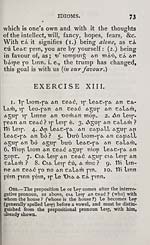Download files
Complete book:
Individual page:
Thumbnail gallery: Grid view | List view

72 THE VERB *oo beic.
is in short sentences. Cia usually aspirates the mutable
consonant which follows it. It enters into a great many
familiar expressions, such as cia ai-j\ bic, who at all (aijv
bic, in life.)
Cat» might be considered a neuter form of cia ; as, cat> é
pn, what is that? cat» fÁ, what for? (-pÁ is a preposition,
and means for or under); cat) fAC? what (is) the reason ?
Why ?
CÁ, adv. where; firon. what; as, cÁ h-Áic, what place ?
CÁ b-ftnb cú, where art thou ? (pronounced quickly in con-
versation as if " kowl thod)" ca Vi-Am, what time ?
ITIeu-o (sometimes written méi-o) is the root of tneu'ouij;,
increase, enlarge, as in go meu'ouiji'ó T)1A cu, may God
increase you, i.e., that is, make you great or happy, increase
your health and wealth. 111 eut) signifies size, amount,
quantity, number; as, An meu'o "OAomeA-o, the number of
people, An meu'o Aingit), the amount of silver.
IDIOMS WITH le.
2. Besides the idiomatic meaning conveyed
by le with the assertive verb if as denoting
ownership, which has been already explained,
page 47, there are other idioms which shall
now be explained.
The verb ir is always used in connection with le, except
where be denotes being alone or being "by one's self,"
beir fern as before shown p. 52.
te with the verb if denotes : firstly, being in
possession of, in the power of, on the side of,
of one's party ; secondly, regarding the mind
is in short sentences. Cia usually aspirates the mutable
consonant which follows it. It enters into a great many
familiar expressions, such as cia ai-j\ bic, who at all (aijv
bic, in life.)
Cat» might be considered a neuter form of cia ; as, cat> é
pn, what is that? cat» fÁ, what for? (-pÁ is a preposition,
and means for or under); cat) fAC? what (is) the reason ?
Why ?
CÁ, adv. where; firon. what; as, cÁ h-Áic, what place ?
CÁ b-ftnb cú, where art thou ? (pronounced quickly in con-
versation as if " kowl thod)" ca Vi-Am, what time ?
ITIeu-o (sometimes written méi-o) is the root of tneu'ouij;,
increase, enlarge, as in go meu'ouiji'ó T)1A cu, may God
increase you, i.e., that is, make you great or happy, increase
your health and wealth. 111 eut) signifies size, amount,
quantity, number; as, An meu'o "OAomeA-o, the number of
people, An meu'o Aingit), the amount of silver.
IDIOMS WITH le.
2. Besides the idiomatic meaning conveyed
by le with the assertive verb if as denoting
ownership, which has been already explained,
page 47, there are other idioms which shall
now be explained.
The verb ir is always used in connection with le, except
where be denotes being alone or being "by one's self,"
beir fern as before shown p. 52.
te with the verb if denotes : firstly, being in
possession of, in the power of, on the side of,
of one's party ; secondly, regarding the mind
Set display mode to: Large image | Transcription
Images and transcriptions on this page, including medium image downloads, may be used under the Creative Commons Attribution 4.0 International Licence unless otherwise stated. ![]()
| Early Gaelic Book Collections > Blair Collection > Treas leabhar Gaedhilge > (78) |
|---|
| Permanent URL | https://digital.nls.uk/82322322 |
|---|
| Description | A selection of books from a collection of more than 500 titles, mostly on religious and literary topics. Also includes some material dealing with other Celtic languages and societies. Collection created towards the end of the 19th century by Lady Evelyn Stewart Murray. |
|---|
| Description | Selected items from five 'Special and Named Printed Collections'. Includes books in Gaelic and other Celtic languages, works about the Gaels, their languages, literature, culture and history. |
|---|

